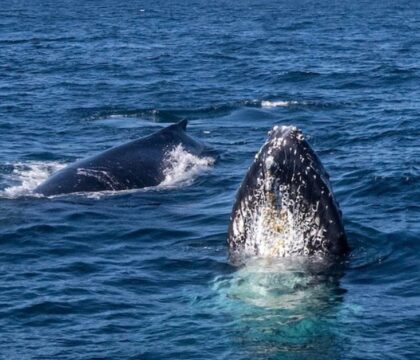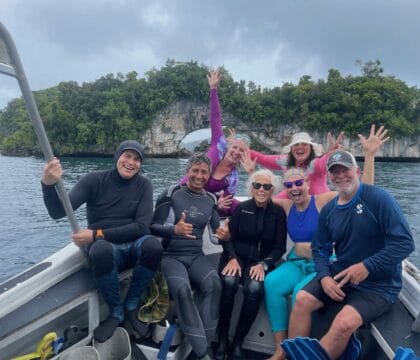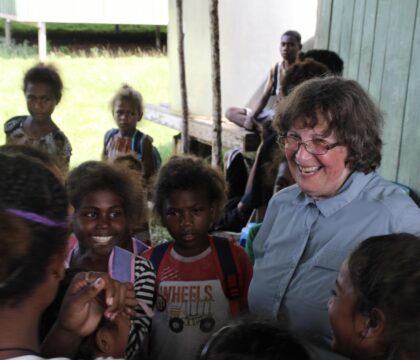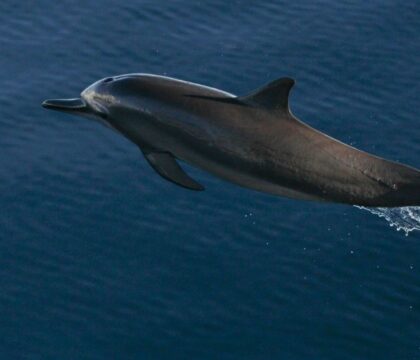July 29, 2024 • News Announcements
From June 8-16, 2024, Oceanic Society teamed up with organizations around the world to address the important task of cleaning up some of Earth’s most vital coastal and ocean environments.. This joint effort, led in partnership with Sea Turtle Week and generously supported by Seiko Prospex and Planet Oat, produced exceptional results. We are excited to present the results of our 2024 Global Ocean Cleanup.
2024 Global Ocean Cleanup Results
A total of 763 volunteers participated in 8 cleanup initiatives supported or led by Oceanic Society in El Salvador, Ghana, Kenya, Maldives, the Philippines, San Francisco (USA), Tonga, and Vietnam. Together, we successfully removed an impressive 18,464 pounds (over 9 tons) of waste from key ocean and coastal locations that include sea turtle nesting beaches, feeding areas, mangrove forests, coral reefs, and coastlines adjacent to marine wildlife hotspots.
In addition to the cleanups supported by Oceanic Society, an additional 43 cleanups took place worldwide during Sea Turtle Week (June 8-16) as part of the overall 2024 Global Ocean Cleanup. Collectively, more than 2,243 volunteers removed 78,477 lbs (or 39 tons) of debris from 54 miles of ocean and coast globally.
These cleanups played a crucial role in the 2024 Global Ocean Cleanup, a collaborative effort that united organizations, brands, and artists in the fight against ocean plastic pollution. Alongside the cleanups, participating organizations repurposed and transformed the marine debris gathered into unique works of art for a friendly art competition. This approach aimed to inspire audiences worldwide to join the global movement to reduce ocean plastic pollution.
The 8 cleanups that were sponsored by Oceanic Society reported the following results:
- Coastal Underwater Resource Management Actions (CURMA) — La Union, Philippines
- 435 volunteers
- 1,120 lbs of waste collected
- Most unusual item collected: Rubber duck toy and tires
- Fundación Zoológica de El Salvador (FUNZEL) — La Paz, El Salvador
- 26 volunteers
- 320 lbs of waste collected
- Most unusual item collected: Motor oil
- Kenyan Youth Biodiversity Network — Kwale, Kenya
- 28 volunteers
- 6,207 lbs of waste collected
- Most unusual item collected: Contraceptive items
- Naifaru Juvenile & Atoll Marine Centre — Lhaviyani Atoll, Maldives
- 26 volunteers (including X scuba divers)
- 277 lbs of waste collected
- Most unusual item collected: Hand pump, computer motherboard, and a shuttlecock
- Vava’u Environmental Protection Association (VEPA) — Olo’ua & Ovaka communities, Tonga
- 60 volunteers
- 2,301 lbs of waste collected
- Most unusual item collected: Old washing machines
- Phu Quoc Sach & Xanh — Phu Quoc Marine Protected Area, Vietnam
- 35 volunteers
- 336 lbs of waste collected
- Most unusual item(s) collected: Cigarette lighters
- Plastic Punch — Greater Accra Region, Ghana
- 115 volunteers
- 5,546 lbs of waste collected
- Most unusual item(s) collected: Shoes & tires
- Oceanic Society — Ocean Beach, San Francisco, California, U.S.A.
- 43 volunteers
- 2,357 lbs of waste collected
- Most unusual item(s) collected: Melted squirt gun toy
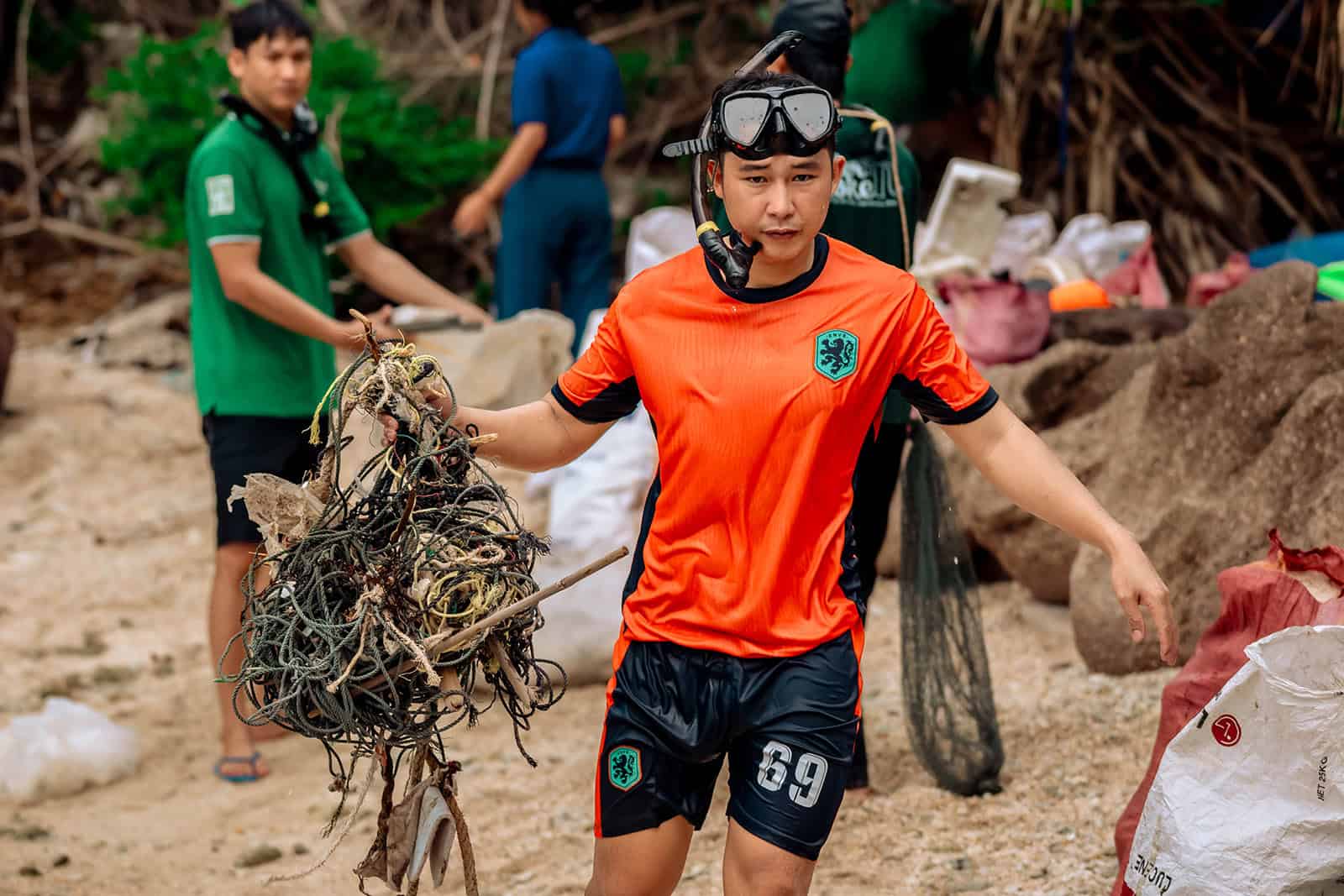
In some locations, like Phu Quoc Marine Protected Area in Vietnam (pictured), cleanups took place both on land and underwater. © Phu Quoc Sach & Xanh
An additional 43 organizations participated in the 2024 Global Ocean Cleanup on a voluntary basis or with support from SEE Turtles. Those organizations reported an additional 1,480 volunteer participants and 60,013 of waste collected. Highlights included an astounding 15,432 lbs (7,000 kg) of waste collected by more than 1,500 volunteers with Agbo Zegue in Togo, as well as 13,227 lbs (6,000kg) of waste collected by 30 volunteers with Bridge in Cameroon.
Much like the 2023 Global Ocean Cleanup, plastic bottles and food wrappers were the most frequently encountered items across the cleanup sites, closely followed by cigarette butts, bottle caps, plastic bags, and microplastic fragments.
The types of waste encountered varied depending on the location. Our partners in Kenya and Tonga reported abundant fishing gear (over 100 lbs at each) such as buoys, floats, net fragments, ropes, and fishing lines. Meanwhile, Ghana found a substantial amount of discarded shoes and flip-flops. The projects in Kenya and Maldives saw lots of plastic bottles, with over 8,000 collected in Kenya alone. Also of note, CURMA in the Philippines collected more than 3,300 cigarette butts. Across all the groups, microplastics were a prevalent issue, with thousands of individual pieces collected and more than 65 pounds of microplastics collected by FUNZEL in El Salvador.
Marine Debris Art Competition
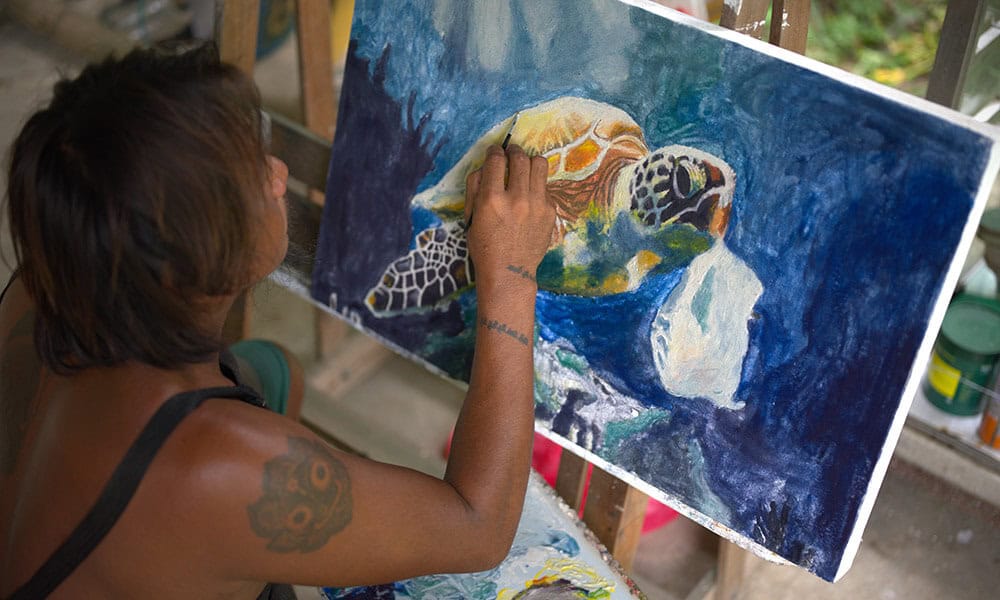
Artist Alger Gueverra paints using pulverized flip-flops that were collected during CURMA’s beach cleanup in La Union, Philippines. The painting won both the Judge’s Choice and Audience Choice.
In addition to their cleanups, seven organizations supported by Oceanic Society created unique artwork using collected waste — see all of their artwork here. The resulting works were reviewed and scored by a panel of judges that included renowned artists and ocean conservationists, as well as an audience choice vote that received more than 5,200 votes. Art contest received additional support from Oceanic Society, totaling $1,500 across the award categories.
The art competition results were as follows:
- Judge’s Choice Winner ($500): CURMA – Philippines
- Runner-Up ($500): Kenya Youth Biodiversity Network – Kenya
- Audience Choice Winner ($500): CURMA – Philippines
Cleanup Campaign Sponsors
The 2024 Global Ocean Cleanup was made possible through the generous support of Seiko Prospex, Planet Oat, Plaine Products, our own Expeditions Impact Fund, and private donations.
Planet Oat supported the Global Ocean Cleanup for the third consecutive year. Their support went towards the global cleanups and digital campaign and is part of their Planet Oat Project, the brand’s pledge to support organizations that better the world we live in. Oceanic Society has been receiving support from Planet Oat since 2020.
Seiko Prospex also sponsored the Global Ocean Cleanup for the third year in a row. Their support went towards the cleanup in San Francisco and is part of a long-term partnership with Oceanic Society that has included sea turtle conservation efforts and coastal cleanups throughout the U.S. and worldwide. Learn more about the Seiko Prospex Mission and Seiko’s commitment to ocean conservation.
About Plastic Pollution & Sea Turtles
Plastic pollution poses a significant and widespread threat to the health of our oceans. Every year, between 4 and 12 million metric tons of plastic make their way into the ocean due to the enormous volume of plastic being produced, combined with inadequate waste management. Unfortunately, this already staggering amount is expected to triple within the next two decades.
The impact of pollution on marine species and habitats is significant. Sea turtles, in particular, have become unfortunate icons for the impacts of plastic pollution on marine wildlife.

While there is still much to be learned about sea turtles and plastic pollution, what we already know is startling: more than half of the world’s sea turtles have eaten plastic in their lifetimes, and scientists estimate that more than 1,000 sea turtles are killed by entanglement in plastic pollution every year.
Thankfully, many solutions exist to combat the plastic pollution problem, and a global movement dedicated to fighting plastic pollution and restoring the health of our oceans is gaining momentum. Initiatives like the Global Ocean Cleanup offer a practical way for individuals to actively reduce the volume and impact of plastic waste in our everyday lives and ultimately, environment. These efforts not only eliminate harmful debris and revive the beauty of our coastlines, but they also provide valuable insights into the sources and types of waste entering the ocean.
While cleanups efforts are crucial, they alone cannot address the underlying causes of ocean plastic pollution. The issue originates from the production, demand, usage, and improper disposal of single-use plastics. A collective and urgent response is needed from corporations, governments, communities, and individuals alike to confront this crisis effectively.
Fortunately, the movement to abate plastic consumption is gaining widespread recognition and support. Many people from all backgrounds are increasingly acknowledging the severity of the situation and taking action. Reusable alternatives are rapidly gaining popularity and becoming the standard, with businesses embracing sustainable practices in response to consumer demand. Governments and corporations are also taking significant steps by implementing bans on single-use plastics and investing in alternative and circular packaging solutions. Social media has played a crucial role in raising awareness and fostering a shift in culture. With the growing momentum to reduce plastic use, we are witnessing a profound transition towards a more environmentally conscious society.
Join the Movement to Fight Plastic Pollution
We invite you to join the global movement to fight ocean pollution by taking action at home. Here are resources to help you get you started:
- Lead a cleanup in your community
- Take our 7-Day Fight Plastic Waste Challenge
- Choose one new action for ocean health
- Explore solutions to ocean plastic pollution
Join us, and be part of the growing Oceanic Society!

